AWP 2015 in Minneapolis
The Association of Writers and Writing Programs (AWP) annual conference proved again to be a whirlwind of readings, panels, bookfair exhibits, reunions, and get-togethers. This year’s gathering in Minneapolis witnessed a turnout of over 12,000 writers of all backgrounds and standings. Among them were WVU’s own professors, Cheat River Review editorial staff, MFA candidates, undergraduate English majors, and alumni.
MFA students Emily Denton and Megan Fahey
WVU’s booth for the bookfair highlighted both Cheat River Review and our MFA program. Current MFA candidates acted as booth participants, fielding questions and handing out goodies to conference attendees. This year, Cheat River Review gave out coasters, pens, and postcards. 2014-2015 poetry editor Xin Tian Koh said, “AWP was, as always, an overwhelming experience, but it was great to meet fellow journal editors, friends, and lovely random writers.” Xin Tian also served on the panel “Microaggressions in the Workshop.”
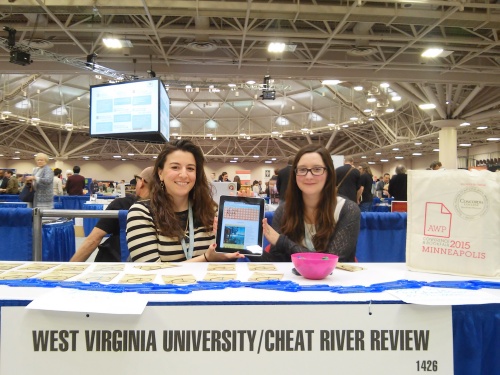
MFA students Megan Fahey and Elizabeth Leo
The three-day conference also consisted of panels and readings by WVU faculty. Program director Mary Ann Samyn read as part of Oberlin Press’ “Oracles and Appetites: Three Decades of the FIELD Poetry Prize.” Department chair James Harms served on the panel “Where We Begin to Revise the Poem.” Third-year MFA Patric Nuttall found this panel particularly useful for his role as an instructor. “The panel was awesome,” Patric said. “(Panelist) Erica Dawson’s concept of remix as revision gave me a new way to teach revision to students.” Other faculty, such as Professor Mark Brazaitis, participated in book signings.
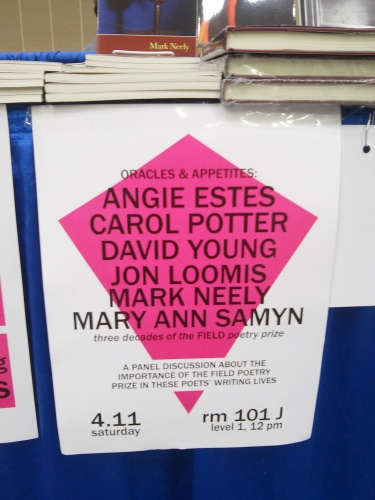
Flyer for Mary Ann Samyn’s Reading
The WVU English Department also hosted a dinner at Mexican restaurant Masa. Seventeen total students and faculty spent a lovely evening chatting between delicious mouthfuls. Gail Galloway Adams, retired WVU English professor and friend to the department, was also in attendance with her quick wit and wonderful passion.
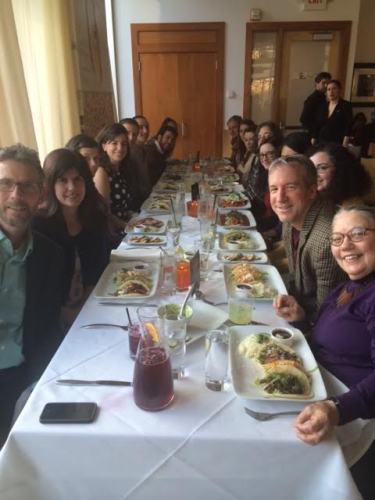
Dinner at Masa
Mark Brazaitis and Gail Galloway Adams
Despite capricious weather, AWP 2015 in Minneapolis was a positive experience. First-year MFA Kelsey Liebenson-Morse said, “The environment is stimulating and invigorating. To be surrounded by so many like-minded people is truly inspirational.”
A Reading with MFA Alumna Renee Nicholson
by Dominique Bruno
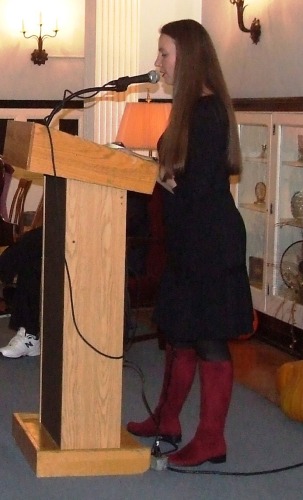
Renee Nicholson
Renee Nicholson, MFA in Creative Writing alumna from West Virginia University, gave a wonderful pre-Halloween reading in spooky Elizabeth Moore Hall on October 30, 2014, in front of an enthusiastic crowd of readers and writers! Renee read from her newest book of poems, Roundabout Directions from Lincoln Center, published as the first book in the Crossroads Poetry Series by Urban Farmhouse Press, as well as from her work with narrative medicine with Doctor Jamie Shumway, former Associate Dean of Medical Education in the West Virginia University School of Medicine. She is now polishing the completed manuscript of Dr. Shumway’s memoirs with the help of his wife, as Dr. Shumway passed away earlier this fall. Renee delivered a touching tribute to him with excerpts of his contemplative yet witty prose. Alongside her many teaching and advising obligations in the Department of Multidisciplinary Studies, Renee is constantly generating new product, and her new poetry is proof that hard work and dedication to craft can only help hone prodigious talent. Perhaps the most memorable part of the evening, however, was when Renee kicked off her reading with a poem about Pop Rocks, and had the foresight to go and purchase real Pop Rocks candies for the audience. For a person who labors hard to make each line of her poetry interesting and beautiful, it was amazing for Renee to read that particular poem with the sound of Pop Rocks crackling throughout the room. I was taking a few pictures, and I could hear the candy popping everywhere, even in the balcony of Elizabeth Moore Hall. In all honesty, Renee’s reading was the best Halloween treat that a writer could have asked for. A big thank-you goes out to the Department of Multidisciplinary Studies and the Eberly College of Arts and Sciences for providing West Virginia University with such a great event.
Virginia Butts Sturm Workshop 2014: Marianne Boruch
by Jessica Guzman
Tuesday Oct 14—Friday Oct 17, 2014
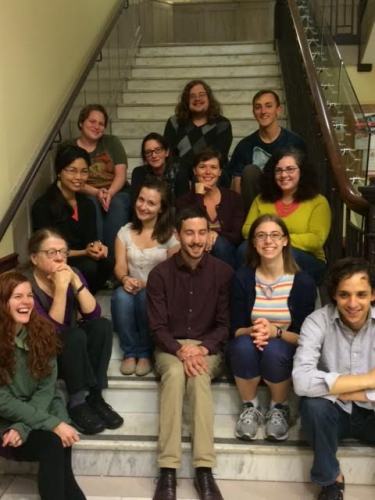
Marianne Boruch and the Sturm workshop participants. Top row: Feagin Jones, Elizabeth Leo, Patric Nuttall, Caleb Milne. Middle row: Xin Tian Koh, Sadie Shorr-Parks, Sarah Munroe, Jessica Guzman. Bottom row: Morgan O’Grady, Marianne Boruch, Travis Mersing, Maryann Hudak, Barrett Lipkin.
On the first night of the Virginia Butts Sturm Workshop, Writer-in-Residence Marianne Boruch set the tone for the week by making a simple request: “Give me an image of something you saw today.” One student described a fallen ice cream cone. Another mentioned a pile of dead flies. Each image was of something broken or unusual, and Marianne pointed out the tension in such disjointed things. “The most important thing to me is: can I see it?” she said. She gifted each workshop participant a 3” X 4” composition book, an “image journal,” with the instructions to record at least five images we see every day. She asked us to recall our earliest memories and to think of those images as poetic beginnings.
We spent the next three days workshopping and writing down everything Marianne had to say. Among many definitions of poetry, Marianne talked about the three guidelines Wallace Stevens discusses in “Notes Toward a Supreme Fiction”: 1. a poem must give pleasure, 2. something must change, and 3. it must be abstract, which Marianne described as “some opening, even a slight opening, to some larger thing.”
With these guidelines in mind, Marianne gave us generous insights into our work and the work of others, helping us articulate what a poem changes by nature of its existence, while still considering how to craft a more precise line. She warned us against editing too early in a draft, and she encouraged us to free ourselves during the early stages of composition. “We don’t keep open long enough with those early drafts,” she said. “Everyone has different voices at different times of the day. It’s not finding yourself, but losing yourself.”
While we spent the bulk of each session discussing our poems, Marianne also engaged us in multiple production and revision activities. One night, we read aloud over fifty definitions of the word “break,” choosing one as inspiration to write a poem. “Scissors are one machine I can understand,” she said on another night, as we cut and rearranged the stanzas of an Eavan Boland poem. Workshop participant Xin Tian Koh said, “Learning about Marianne’s relationship to poetry was refreshing—I plan to steal some of her ideas for my classes.”
Marianne was extremely generous with her time. In addition to workshop sessions, she also met with all participants in small groups at the Hotel Morgan. During my group session, she asked us about our poet “crushes” and how we started writing poetry. We talked about the obsessive nature of writing and the fears of a looming audience. “Treat submitting as a hobby, like raising tropical fish,” she said. “But the real work is between you and your poems.” At the end of the meeting, she gave each of us a list of poets to read based on our individual workshop manuscripts. That evening, Marianne and her husband joined James Harms, chair of the English department, Mary Ann Samyn, director of creative writing, and the third-year poetry MFAs for dinner at Iron Horse Tavern.
Marianne also gave two readings during her time in Morgantown. On Thursday, October 16th, she read poems from The Book of Hours, Cadaver, Speak, and her newest untitled manuscript, to a crowd in the Robinson Reading Room of the downtown library. During the reading, Marianne talked about her experiences writing each collection. Of the title poem from Cadaver, Speak, she talked about taking an anatomy class at Purdue University. “My speaker is my favorite cadaver,” she said. “Everyone has [a favorite] in the cadaver lab, turns out.” The following morning, Marianne read prose from The Glimpse Traveler, a memoir recounting a nine-day trip she took in 1971.
Marianne believes that a poem can start with mystery and head toward clarity, or start with clarity and head toward mystery. “Poems really are made of sound and silence,” she said. Like a poem, this year’s Sturm workshop provided both through reflection, creativity, and care. Thank you to Marianne Boruch for her generosity during her time as Virginia Butts Sturm Writer-in-Residence, and thank you to the creative writing faculty at WVU for their support in making Sturm happen.
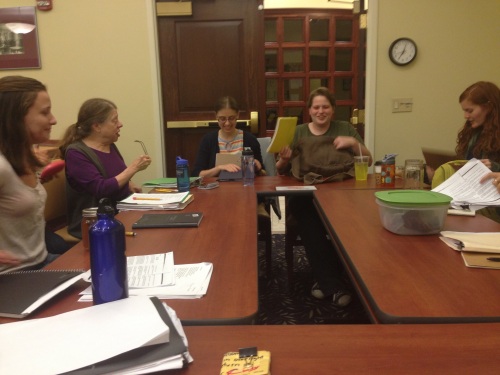
During workshop. From left: Sadie Shorr-Parks, Marianne Boruch, Maryann Hudak, Feagin Jones, and Morgan O’Grady.
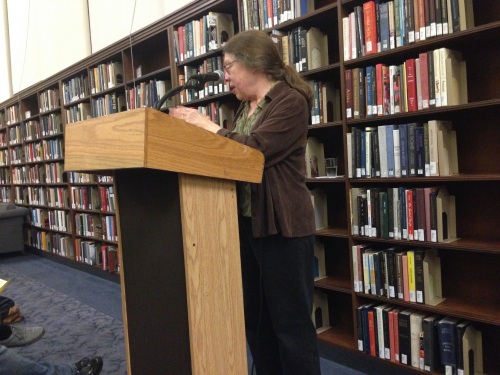
Marianne Boruch reading in the Robinson Reading Room of the downtown library.
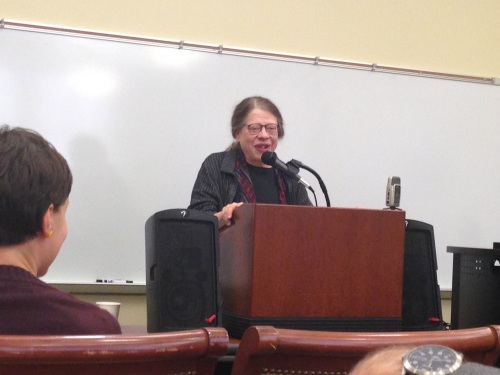
Marianne Boruch reading in 130 Colson Hall.
Poet and essayist Marianne Boruch is the author of seven collections of poetry, including, most recently, Cadaver, Speak (2014); The Book of Hours (2011); Grace, Fallen From (2008); and Poems: New & Selected (2004). Her honors include the Kingsley Tufts Prize, fellowships from the Guggenheim Foundation and the National Endowment for the Arts, residencies from the Rockefeller Foundation’s Bellagio Center, Pushcart Prizes, and a Fulbright/Visiting Professorship from the University of Edinburgh. She has served as a visiting artist at the American Academy in Rome, and at Isle Royale, America’s most isolated national park. Boruch has taught at Tunghai University in Taiwan, and at the University of Maine at Farmington, going on, in 1987, to develop and direct the MFA program in creative writing at Purdue University where she continues to be on faculty. Since 1988, she has also taught semi-regularly in the low-residency graduate Program for Writers at Warren Wilson.
Alumna Kelly Moffett Visits Colson Hall
On October 6th, Colson Hall was treated to a poetry reading by WVU MA and MFA alumna Kelly Moffett. Kelly started out by reading from A Thousand Wings, which she wrote after spending time visiting convents and a Trappist monk monastery. She also read from her forthcoming collection, bird blind.
While reading, Kelly often added transitional phrases to her poems that listeners following along in the book did not find printed. During the Q&A portion of the event, she talked about the differences between the voice spoken aloud and the voice on the page. “I think on the page, because it’s taking such a slow pace, some of the lines can be digested fully,” she said. “But whenever I’m reading aloud, I sink into this space of a voice speaking to the self or a definite you, so I try to make it more colloquial.”
After the reading, Kelly went to Hatfield’s with Mary Ann Samyn and several MFA students, where the group talked about graduate school and poetry over lunch.
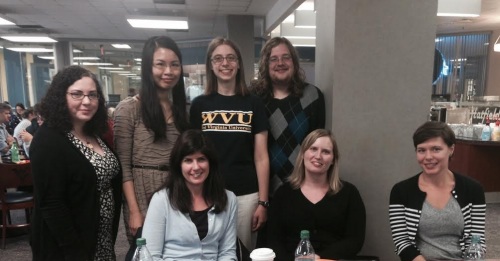
At Hatfield’s.
Kelly Moffett has two books of poetry and one chapbook. Her third book, bird blind, will be released this fall. Her work has appeared in journals such as Colorado Review, Cincinnati Review, and Rattle. She is an Assistant Professor at Northern Kentucky University and a graduate of the WVU MA and MFA programs.
Mark Brazaitis Wins the Autumn House Press 2014 Fiction Prize
by Maggie Behringer
We often imagine that our childhood games of truth-or-dare and trust-hand-slap do not follow us into adulthood.
For the characters in Mark Brazaitis’ new collection, Truth Poker, those simple games—moments of venerability on the fault line between the truth and a lie—are equally high stakes for both children and adults.
Brazaitis’ new work recently won the Autumn House Press 2014 Fiction Prize. The Pittsburgh house will publish the book early next year.
“Truth Poker is a collection of 15 stories whose outcomes hinge on how characters engage with a truth (about a situation, about themselves),” Brazaitis said. “In a crucial moment in their lives, will they tell the truth or conceal it? What will the consequences of their decisions be?”
These small, subtle moments play with the tension between a person’s internal existence and the life that others see. What should be exciting, like a pregnancy, or comforting, like a son’s relationship with his father, is only a guise for a lie.
A wife, who halfheartedly opted for a family rather than an academic career, faces the choice of putting her husband’s name on a journal article she penned or giving herself the credit. Hanging in the balance is his approval for tenure at a university.
Four female friends in their mid to early thirties are pregnant, but one of the women, the story’s leading lady, is faking it.
In the collection’s title piece, two boys play a real life version of truth poker. When a person loses a hand, he is required to answer his friend’s question. One of the boys, again the story’s main concern, has lost his mother and is living with his father.
Through playing the game, he slowly finds connections between his mother’s suicide and his father’s relationship with an Ohio congressman. As it turns out, the boy’s playmate is the congressman’s nephew.
“Autumn House has an excellent reputation as a press that produces beautiful books and promotes its authors and their work,” he said. “A short-story collection isn’t the easiest to publish, and I am thrilled to have an excellent press behind Truth Poker.”
Brazaitis’ manuscript was selected by Sharon Dilworth, the author of Year of the Ginkgo, an associate professor of English at Carnegie Mellon University and, like Brazaitis, a former Iowa Short Fiction Award winner.
The Autumn House Press award is attached to a travel and publicity grant. As he gears up to promote the book, Brazaitis is keeping his fingers crossed for an invitation to read in Hawaii.
Alumni Spotlight: An Interview with Sarah Einstein
Interview by Jessica Guzman
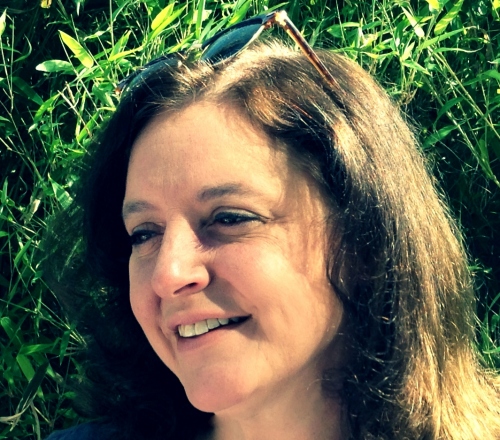
Sarah Einstein
Since graduating from WVU’s MFA program in 2011, Sarah Einstein has been busy making a name for herself in the literary world. Her book, Mot, A Memoir, won the 2014 AWP Award Series for Creative Nonfiction, and it is forthcoming from the University of Georgia Press. She has published in numerous journals, including PANK, Ninth Letter, and The Sun, as well as the anthologies Southern Sin and Writing Into the Forbidden. Her work has been awarded a Pushcart Prize and Best of the Net. She serves on the editorial staff of multiple literary journals and co-runs the blog Writers for Dinner. All this while studying creative nonfiction in the PhD program at Ohio University.
Despite her busy schedule, Sarah generously agreed to answer questions about her new book, her experiences in the literary world, and her plans for the future. Thanks to Sarah for her time, and congratulations for all her success! Please enjoy the interview below, and be on the lookout for Mot, A Memoir in 2015.
JG: What has your writing life been like after graduating from WVU? Tell me about your experiences in the PhD program at Ohio U. How do these experiences differ from your time working on your MFA? What struggles or pleasant surprises?
SE: The MFA program at WVU was wonderful in that it allowed me to focus completely on my writing and work with mentors who really took the time to focus on my work on the level of the line. Every time I write a sentence that isn’t hideous, I have Kevin Oderman to thank. In the PhD program at Ohio University, I also get to work with wonderful mentors, such as Dinty W. Moore, but the work is more focused on larger issues: how to build a collection of essays, how to teach creative writing, how to be a good literary citizen. It’s been the perfect path toward developing a writing practice: first, at WVU, with a focus on the writing itself and then, at Ohio University, a focus on how to publish that writing and how to become a working writer in academia.
JG: I know you’ve worked on Brevity. Have you also worked on other literary journals at OU? You also teach. How do these experiences influence your writing? How do they affect your writing life?
SE: I had a great three years at Brevity, and am really excited that fellow WVU MFA alum Kelly Sundberg has now stepped in to be the Managing Editor. What it taught me is that I need to do editorial work as part of my writing practice. I’m envious of those writers who really and truly can write every day; I am not one of them. With an editorial position, though, I can be disciplined about doing something related to writing every day—whether it’s reading submissions, sending out rejection (sorry!) and acceptance letters, or just attending to paperwork—and that’s become very important to me. Now that my term at Brevity is up, I’ve moved on to working as the Graduate Student Advisor to Sphere, Ohio’s undergraduate literary journal, and the fiction editor at Stirring, the literary journal of Sundress Academy for the Arts. I really feel that, for me, having editorial work is key to continuing to write. The inspiration I draw from reading the submissions, the way in which it allows me a break from struggling with my own work while still letting me keep to my writing schedule, has become very important to me.
Teaching creative writing has also become essential to my writing practice, mostly because my students are so good, and so enthusiastic, and so interested. I leave workshop with so much energy and enthusiasm! It’s like a battery I go and plug myself into, and I’m really grateful for that.
JG: Tell me about Mot. For how long were you working on this memoir? What was your writing process? Did you have any particular difficulties? When did you know the book was ready for publication?
SE: Mot was my MFA thesis before it was a book, and every good thing about it I owe to my mentors, particularly Kevin Oderman, Sara Pritchard, Ethel Morgan Smith, and Dinty W. Moore. This is the great joy of being a creative writing graduate student: people who are better, more accomplished writers than you are will spend a great deal of time helping you make your own work better, and the end result will be a collaborative effort that’s much better than anything you could ever have written on your own. I wish this could be my writing practice for ever: I write some flawed thing, and then I have coffee with Kevin in his office or take a section of the book to Dinty’s workshop, and by the time that hour or two is over, the flawed thing is less flawed, and I see how to make the next part less flawed as well. As I understand it, pretty soon I’m going to be expected to be able to do this work largely on my own. I’m not at all happy about that.
JG: Despite your many projects, you blog with your husband at Writers for Dinner, which also contains posts from various other contributors. Why did you decide to start this blog? What is the blog’s purpose?
SE: We started WFD because we wanted a project we can work on together. Although we’re both writers, we work in very different parts of the literary world. Dominik writes urban fantasy and translates popular novels for the German publisher Feder & Schwert, while I write memoir and literary nonfiction, so it was hard to find much common ground. We realized we both love to cook, and we are surrounded by writers who are also graduate students and so could use a free dinner now and then, and so WFD seemed the perfect way to work together.
I have been really overwhelmed by the success of the blog. It was named a “favorite” by the journal Alimentum: The Literature of Food, has more than three thousand followers, and we have published some amazing writers including David Lazar, Jill Talbot, Kelly Sundberg and Kevin Oderman. (Go, WVU folk!) We are really grateful for the reception the blog has gotten from the writing community. It’s been a lot of fun, and we have had a lot of great dinner table conversations with other writers as a result.
JG: What are your plans for the future? What other writing projects are you working on?
SE: Right now, I’m at work on an essay collection tentatively entitled Noun: Person, Place, and Thing. Since I took a theory class from Donald Hall in my first year in the WVU MFA program, I’ve been fascinated by the ideas put forth by Paul Ricouer in Oneself as Another. Without walking too far down the rabbit hole, Ricouer posits that the self is really broken down into two parts: the what and the who. These are connected by a narrative self, the self that posits “what if” and tells itself a very edit version of what has happened thus far. The collection explores this complicated construction through lyric, collage, braided, and narrative essays. That sounds overly thinky, probably because it’s also my dissertation project. Hopefully, the collection will be more compelling than I’ve been able to make it sound here.
JG: What advice would you give current students in the MFA program here at WVU (or anywhere)?
SE: Write! Get involved in literary journals and help to stage readings and read everything you can get your hands on, but most of all, write and listen to what your mentors say about what you have written.
Thank you, Sarah!
"The Aesthetics of the Ragged Edge": Dickinson scholar Marta Werner visits Colson Hall
By Xin Tian Koh
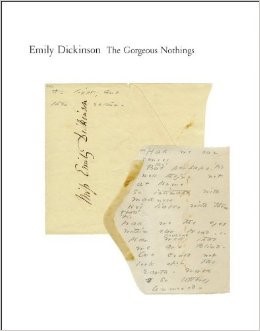
Image from Amazon.
On the morning of September 24th, Colson Hall and its tenants welcomed Professor Marta Werner of D’Youville College, a renowned Dickinson scholar and co-author of The Gorgeous Nothings: Emily Dickinson’s Envelope Poems. Professor Werner gave a lecture on Dickinson’s late manuscripts. Most of these manuscripts were written on scraps of paper or envelope fragments, which can be found at the Emily Dickinson Collection at Amherst College. Professor Werner talked about the challenges and joys of reading, presenting, and making sense of Dickinson’s handwritten poems: “I try to contextualise as much as I can… [and] be clear as much as possible about the distance between that piece of paper and me.”
In the afternoon, Professor Werner visited Jim Harms’ graduate poetry workshop, where we were privileged to get a closer look at detailed, true-to-size, full-colour facsimiles of the envelope poems. With Professor Werner’s explanations, we could see how Dickinson turned and folded the paper as she wrote, and her “refusal to make smooth, elegant sentences” in her own hand.
Copies of the The Gorgeous Nothings were on sale, courtesy of the WVU Bookstore. If you missed the lecture, these books are still available at Barnes and Noble beside the Mountainlair (while they last)!
MFA Rooftop Reading at the Hotel Morgan
by Xin Tian Koh
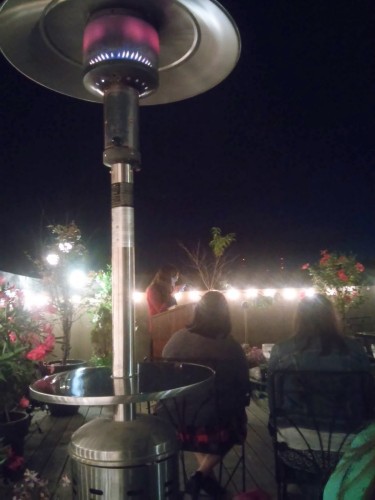
First-year poet Elizabeth Leo reads.
On the evening of the 13th of September, the MFAs of Morgantown converged at the historic Hotel Morgan’s Montmartre rooftop restaurant to share their stories, essays and poems. It was a lovely way to begin the new school year and to meet the new cohort of first-year MFAs. Thanks to Council of Writers president (and second-year creative nonfiction MFA) Claire Fowler for organising the event, and to our classmates and professors for supporting it!
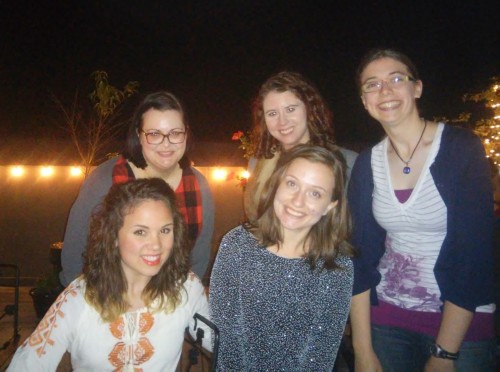
CNF writers pose for a photo.
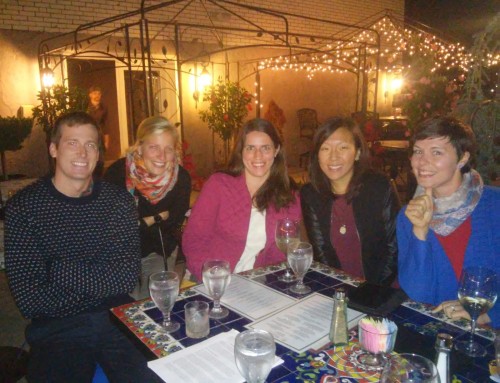
First-year MFAs.

A view of downtown Morgantown from the rooftop.
A Fiction Reading with Michael Blumenthal
On September 18th, listeners in the library’s Robinson Reading Room had the pleasure of hearing Michael Blumenthal read his work. For the first time, Blumenthal read a short story from his new collection, The Greatest Jewish-American Lover in Hungarian History: Stories. The story, told in alternating perspectives between the two principal characters, described the relationship between a professor and a student as they navigate the complex nuances of mentorship. Thank you, Michael Blumenthal!
Michael Blumenthal, the former Director of Creative Writing at Harvard and a graduate of the Cornell Law School, has three new books coming out this year: Just Three Minutes, Please: Thinking Out Loud on Public Radio (WVU Press); “Because They Needed Me”: The Incredible Struggle of Rita Miljo to Save the Baboons of South Africa (Pleasure Boat Studios); and The Greatest Jewish-American Lover in Hungarian History: Stories (Etruscan Press). He is also the author of the memoir All My Mothers and Fathers; a collection of essays from Central Europe, When History Enters the House; and the novel Weinstock Among the Dying, which won Hadassah Magazine’s Harold U. Ribelow Prize for the best work of Jewish fiction. Currently, he is Co-Director of the Immigration Clinic at The West Virginia University College of Law.
Author George Singleton Visits Colson Hall
On September 9th, the English Department was treated to a fiction reading by award-winning author George Singleton. During her introduction, MFA Maggie Behringer noted that the world of Singleton’s fiction is not stranger than ours, “he just has better eyes.”
This statement proved true as Singleton took to the podium. Before even reading from his book, he entertained the crowd with playful tales of his publishing experiences. Singleton described the “breakup” between himself and his agent, mentioned the time an editor tried to change all of his “I only want”s to “I want only”s, and even included the story behind a recurring character, Stet Looper, whose name was a practical joke on his editors. (In editing, stet is used to inform typesetters and writers to disregard a change an editor had previously marked.)
With the crowd already laughing, Singleton went on to read “Vaccination,” a short-story from his collection Stray Decorum. “Vaccination” follows Edward Johnson, and his dog Tapeworm, on a bad date with a woman from the veterinarian’s office. True to form, the story was equally filled with moments of amusement and clarity.
Before the reading, Singleton had visited Professor Glenn Taylor’s graduate fiction workshop. Professor Taylor had the following to say about Singleton’s visit to Morgantown: “George’s visit was brief as a celestial streaking, but he filled it up nicely. He wrote down the names of all of my students in workshop and asked them where they were from, then told a story involving whatever place they gave. He met people on the street and carried on long conversations with them about their dogs or cigarette brand preferences. He explored Morgantown and took pictures of its hills and bridges, and he sang songs by the Pogues at 2 in the morning, his arm around a stranger who sang right along with him. George is one of a kind, and we are lucky to have had him.”
As the reading drew to a close, Singleton advised all students present to remember the importance of community in the writing world. “You should all remember that we’re all in this together. When one person wins, you all win. Especially in a workshop, because you’ve all worked on everyone’s stories, so you’ve helped make that.” A wonderful ending to a memorable reading.
In case you missed it, the audio of this reading is available at WVU’s Center for Literary Computing.
George Singleton, who holds the John C. Cobb Chair in Humanities at Wofford College, has published six collections of stories, two novels, and a book of writing advice. His next collection, Calloustown, will be published in November 2015. Over 200 of his stories have appeared in magazines such as the Atlantic Monthly, Harper’s, Book, Playboy, Zoetrope, Georgia Review, Southern Review and elsewhere. His work has been anthologized in ten issues of New Stories of the South—the Year’s Best, and in a number of other anthologies as varied as Best Food Writing 2005 and Dog is My Co-Pilot. Essays about his work have appeared in Still in Print and Behind the Short Story, among other books. His nonfiction has appeared in Oxford American, Garden and Gun, Bark, and elsewhere. Singleton received a 2009-10 Guggenheim fellowship, a 2011 Hillsdale Award from the Fellowship of Southern Writers, and was inducted into the South Carolina Academy of Authors in 2010. The Atlantic Journal-Constitution labeled him “the unchallenged king of the comic southern short story.”

 Feed
Feed